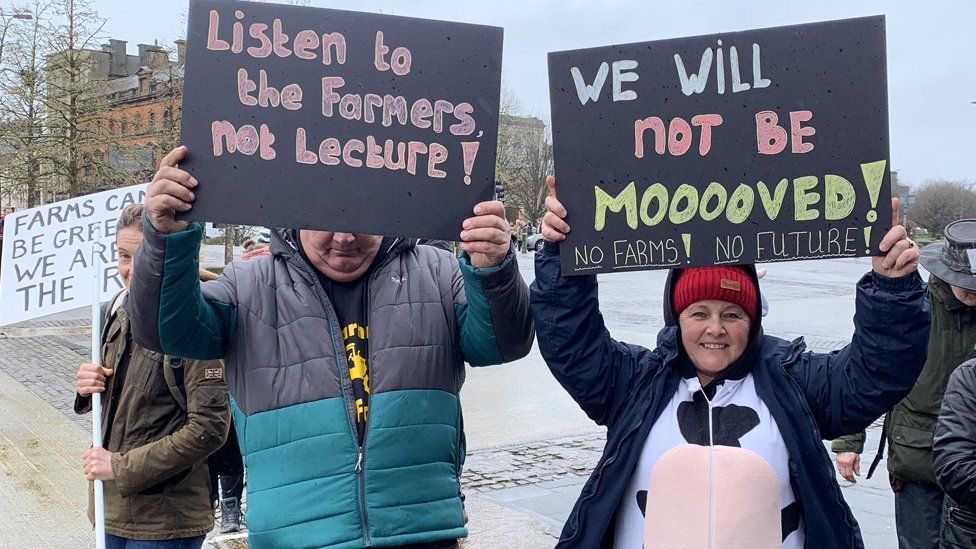
Protesters gathered outside Senedd in subsidies row
By Steffan Messenger & Miriam Barker
BBC Wales environment correspondent
Thousands of farmers descended on Cardiff Bay protesting against the Welsh government’s new environmental subsidy plans.
They were objecting to a major overhaul of farm subsidies, branded “unworkable” by unions.
The proposals would require farmers to commit 10% of agricultural land to be used for trees and another 10% for wildlife habitat.
The Welsh government said it was listening to the sector’s concerns.
About 2,500 people turned up at the Senedd to urge the Welsh government to listen to the “anguish” of rural communities.
In a joint statement on Tuesday, outgoing First Minister Mark Drakeford and Rural Affairs Minister Lesley Griffiths announced a list of actions they would take following talks with farming leaders.
They included considering an “evidence-based review” of the ways farms can help soak in planet-warming carbon emissions, and carrying out updated economic analysis of the new post-Brexit subsidy scheme.
A requirement for all farms to ensure 10% tree coverage in exchange for funding in future has proved hugely controversial.
An economic impact assessment published alongside the latest consultation suggested the government’s plans could lead to a 10.8% reduction in livestock numbers and an 11% cut in labour needed on Welsh farms.
Ministers have since said that analysis was outdated and did not take into account all parts of its new funding scheme.
But the figures sparked protest meetings attracting thousands at Welshpool in Powys and Carmarthen, and go-slow tractor demonstrations across Wales throughout February.
Farmers sounded their horns as they drove through Newtown in Powys to protest the scheme
The feeling from farmers at the Senedd was there was a disconnect between their livelihoods and the decisions being made in Cardiff Bay.
Abi Reader, NFU Cymru deputy president, said people had come from the “hills and mountains, from the valleys and coastal areas”.
“We are completely united,” she said, as she branded the subsidy plans “crazy”.
Tom Huntley, a farmer from Pontypridd, Rhondda Cynon Taf, said there was a real strength of feeling in the crowd.
“We’ve all come down today because the ministers are just not listening. It could be very serious for the future,” he said.
Protestors, including farmer Tom Huntley told the BBC they had gone down the Senedd because they want the Welsh government to listen to them
Angela Windsor, a farmer from Moylegrove, Pembrokeshire, said: “We’re not happy about this sustainable farming scheme proposed by the Welsh government. It doesn’t include farming at all.
“For some people who haven’t got any trees or habitat – they’re going to lose 20% of their land.”
Another protester, John, said he was proud of farmers coming together, saying: “All of us will have very different reasons for why we are going to what will be a historical symbol of unity in the name of the Senedd (Wales’ parliament).
“A protest of this magnitude hasn’t been seen since 1999. This tells you very clearly of the anxiety and concern that surrounds the industry and the rural way of life.”
‘Not considered, not valued’
The discontent among farmers in Wales has its roots in many issues besides the new subsidy regime – from the handling of bovine TB to the imposition of stricter regulations on the spreading of manure.
NFU Cymru President Aled Jones said in his 12 years as a union official he had “never witnessed such anguish in rural communities”.
“There’s a sense that they’ve not been listened to, not considered, not valued,” he said.
He called on the government to reset its relationship with the countryside, and suggested the introduction of the new funding scheme may need to be paused.
“Fundamentally we have one opportunity to get this right,” he added.
South Wales Police issued an order that says participants must follow an approved route and park in a designated area
Protesters lined up wellies on the steps of the Welsh Parliament as a symbol of future job losses, which they believe could happen as a result of these new subsidy plans.
The government’s own assessment of the scheme estimates that, if introduced, it could lead to an 11% reduction in farm labour.
NFU Cymru said this could translate to more than 5,500 jobs being lost.
But the assessment added that workers may still be needed for other non-farm related work, such as management of woodland
Protestors put wellies out on the steps of the Senedd to symbolise the loss of jobs from these new scheme
Inside the Senedd, members are set to debate and vote on a motion brought by the Welsh Conservatives calling for the Sustainable Farming Scheme to be scrapped, followed by a Plaid Cymru motion calling for urgent changes to the government’s approach to bovine TB.
Andrew RT Davies, leader of the Welsh Conservatives in the Senedd, said farmers in Wales had sent a message that “enough is enough”.
“The Sustainable Farming Scheme will have a devastating impact on our farming communities, and farmers are rightly not prepared to take it lying down,” he said.
Plaid Cymru leader Rhun ap Iorwerth said the government needed to pause the introduction of its new funding scheme “in recognition of the strength of feeling”.
“That would give time to reflect on the arguments that have been made during the consultation and allow them to hopefully set off on a different trajectory in terms of showing the Welsh government cares for agriculture and rural Wales,” he said.
“Currently that isn’t how it feels.”
The Welsh government said it wanted “a successful future for Welsh farming.”
“We have had a seven year conversation with farmers to design future farming support and we are committed to continuing to working with farmers to develop the Sustainable Farming Scheme,” a spokeswoman said.
“We have been clear we expect changes to be made following the consultation, and we will continue to listen.”
The Sustainable Farming Scheme consultation is set to close on 7 March.








